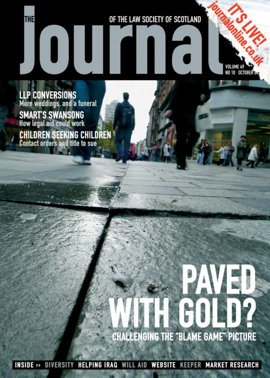Major role for new tribunal
The new Mental Health (Care and Treatment) (Scotland) Act 2003 is a milestone in mental health law. It will bring real benefits for people with mental health problems in Scotland and those who care for them by making sure effective care and treatment is received.
The Act also establishes the new Mental Health Tribunal for Scotland (MHTS), which is due to be operational from April 2005.
After April 2005, decisions will no longer be made in the sheriff court, but rather by way of a tribunal hearings system involving three-member panels. Members of this independent body will make decisions in a wide range of situations, including whether someone should be compelled to accept treatment for mental disorder where certain strict criteria are met.
These panels will comprise a legally qualified member who will be the convener of the panel, a medical member and a general member. In certain situations, for example when dealing with restricted patients, the tribunal panel will still be convened by a sheriff. It is anticipated that the tribunal will handle between 3,500 and 5,000 cases a year.
The establishment of this new tribunal body marks a fundamental change in the way decisions will be made about the long-term compulsory care and treatment of people in Scotland who suffer from mental disorder. The tribunal will consider both the compulsory powers sought and the plan of care proposed for the individual. Under the provisions of the new Act, the legal framework will allow users and carers full rights of participation.
The tribunal will be expert in both mental health law and mental health services, to make sure the Millan Report’s principle of reciprocity is fairly applied. The principle of reciprocity imposes a parallel obligation on the health and social care authorities to provide safe and appropriate services, including ongoing care following discharge from compulsory treatment.
Planning for the tribunal has involved consultation with relevant bodies involved in providing mental health services and care, including the Royal College of Psychiatrists and the Mental Welfare Commission.
The tribunal, as a judicial system, will be required to operate within formal rules of procedure. These rules are currently being drafted and are scheduled to be laid before the Scottish Parliament in January 2005, in time for the tribunal to be operational in April 2005.
To that end, the tribunal is keen to draw on the legal community to provide panel members who have drive and commitment; and have the ability to reach decisions as part of a team.
Legal members need to be comfortable with becoming experts in the new legislation, and then taking the lead role in ensuring that panel members interpret and comply with the legislation at all times. They will demonstrate independent thinking and be prepared to state and support their own decision, whilst able to follow oral argument. The legal member should also be able to balance evidence, keep to the facts and apply objectivity. He or she should also be able to interview and question effectively, drawing out information from patients that may be relevant to risk assessment.
A heavy workload is anticipated next year as “section 18” orders under the Mental Health (Scotland) Act 1984 are replaced by compulsory treatment orders under the 2003 Act. Compulsory treatment orders can only be granted by the new tribunal and the criteria for detention are set out with greater clarity and precision in the new Act.
The tribunal will be supported by administration staff based in new headquarters in South Lanarkshire, although tribunal hearings will be held at various locations across Scotland.
Recruitment for the President and legal members is already underway. For further information on the Mental Health Tribunal for Scotland, please see the website at www.mhtscot.org.
In this issue
- Citizenship, society and solicitors
- The well unfair state
- Litigation nation
- Best medicine
- Take a deep breath
- What title?
- Walk this way?
- Know your strategy
- e-quilibrium?
- The researchers
- Rights out of anarchy
- Political correctness or positive change?
- Steering clear
- How far can a board go?
- Major role for new tribunal
- The race is on (again)
- Planning a superhighway
- Website reviews
- Book reviews
- Single survey's lonely heart
- In harmony
- Clearing the path






